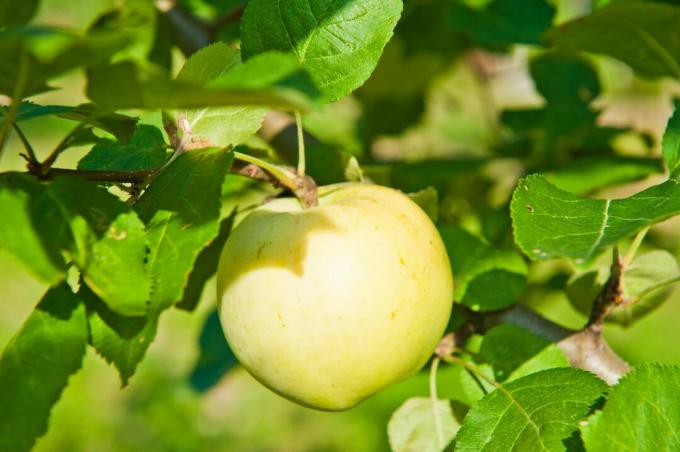Of course, the so-called winter banana apple has little to do with the exotic fruit. But what makes the apple variety special and how to grow the winter banana apple in the garden, we reveal here.

The winter banana apple (Malus domestica 'Winter banana apple') also becomes in English Flory of Winter Banana called and is preferably used for delicious juices and musts. However, it can also be used as a table apple because of its good shelf life. The climate and location requirements are not exceptionally high and the variety is generally resistant to biotic and abiotic adversities. In combination with a slow-growing rootstock, a regular and well-fruiting tree is created that requires little pruning. Therefore, the winter banana apple is an optimal variety for the home garden.
contents
- Winter Banana Apple: Wanted Poster
- Origin and history of the apple
- Taste and properties of the winter banana apple
- Peculiarities during cultivation
- Harvest time and use of the apple variety 'Winterbananapfel'
Winter Banana Apple: Wanted Poster
| synonyms | 'Flory of Winter Banana' |
| fruit | medium to large; yellow-green with a light to cloudy orange top colour |
| the taste | rather sweet |
| yield | high and alternating; mid-late onset |
| harvest time | mid to late October |
| maturity | since December |
| shelf life | very good; can be stored until April |
| growth | strong; lots of fruit wood |
| climate | medium claim; tolerant of frost; better aroma in warm areas |
| diseases and pests | low susceptibility to apple scab and specks |
Origin and history of the apple
The origin of the winter banana apple has not been clarified: the variety probably arose by chance around 1870 in the USA. However, the exact location is not known, or at least a well-kept secret. In Lower Austria, the winter banana apple is still occasionally cultivated and can also be found there in newer orchards because it also has good useful properties for professional cultivation.
Taste and properties of the winter banana apple
The fruit of the 'Winterbananapfel' variety is medium to large. The shape can range from slightly conical to oblate spherical. However, the largest diameter is always found on the stalk (“steep-bellied”). Sometimes the halves are differently pronounced and it is not uncommon to find a rusty seam that stretches from the stem to the calyx.
The skin is yellow-green, the overall color is light to cloudy orange and not very shiny. Sometimes it is decorated with net-like rust patterns, which are often isolated and not found on the whole fruit. The flesh is yellowish-white, firm and neither very juicy nor overly acidic or aromatic, but rather sweet. Winter bananas grown in cool locations have less flavor than those grown in warm locations.

Peculiarities during cultivation
The 'Winterbananapfel' variety grows vigorously and forms a broad pyramidal crown on its own roots. It naturally produces enough fruit wood so that it can be cultivated as an orchard. Depending on the rootstock, however, the variety can be brought into any desired shape. If the winter banana apple is cultivated on a weak rootstock like M26 or M9, it can be formed into a slender spindle or as trellis fruit - but here a connection is mandatory necessary. If you want a somewhat stronger and more stable tree or a bush tree in the garden, you can choose an M7, M4 or MM 106 rootstock.
The cutting effort on the winter banana apple is low, especially when using weak documents: Occasionally, the crown are thinned out and shoots that are too steep are diverted to sloping alternatives or tied down. On stronger bases, however, care must be taken to ensure that the winter banana apple is pruned carefully but annually.
The flowering of the winter banana apple is slightly frost-sensitive and also takes place late in spring. It is a good pollen donor and can even be obtained from other late varieties such as 'Fuji', 'Gala', 'Gloster' or 'Elstar' to be fertilized.
The winter banana apple has moderate climate and soil requirements, making it well-suited to most standard home gardens. Its natural health contributes a good deal to this suitability, even if there is a low susceptibility to apple scab infections and specks, i.e. a physiological calcium deficiency.
Warm locations improve the aroma of the fruit, while frosty locations are less suitable: the winter banana apple can suffer damage from wood frost.
Harvest time and use of the apple variety 'Winterbananapfel'
The delicious winter banana apples can be harvested between the middle and end of October and are then – if the storage conditions are good – well suited for storage until April. If you want to enjoy the apple right away, wait until December to pick it. In storage, too, the apples are only ready to eat between December and April. Basically, the winter banana apple can be used for any purpose, but traditionally it is primarily used as a table apple and for juicing and cidering.

That the winter banana apple sometimes grows with a thick half and a narrow half is usually due to pollination issues. In our article on apple tree blossom learn everything about flowering and how to avoid frost damage.

